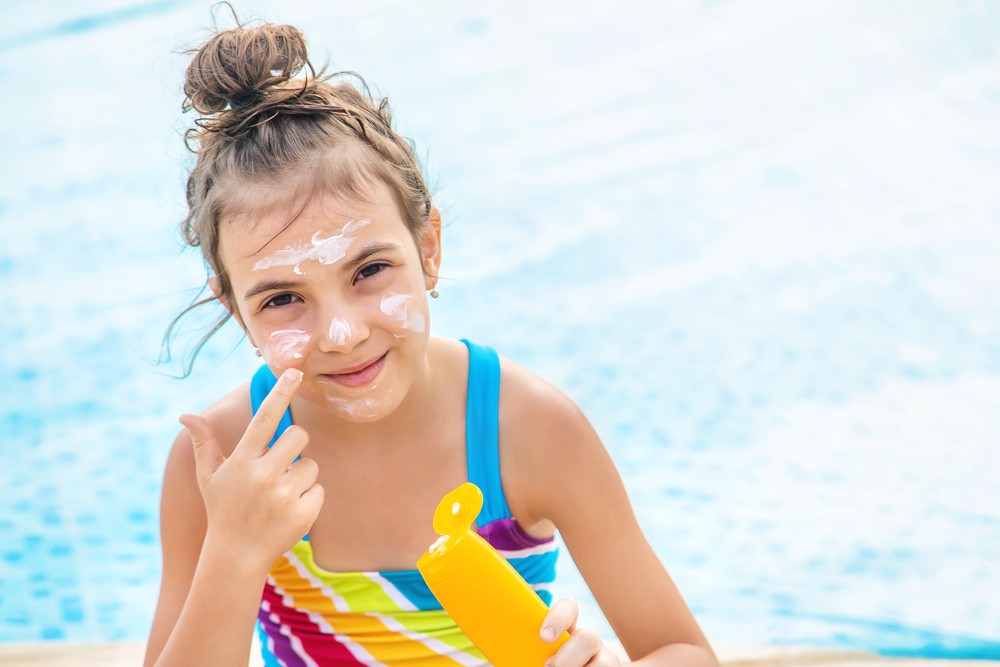Fun in the Sun: Staying Safe

Spending time outdoors to get fresh air, sunshine, and a break from computer screens is a great way to reduce stress, soak in some vitamin D, and stay active. While Memorial Day typically marks the unofficial start of summer, the warm weather has already arrived in many parts of the Midwest. Ashley Lisek, a family medicine APN in the OSF Medical Group, provides safety tips for pre, during, and post outdoor adventures.
“Any time that you go outside and can see the sun is a good time to put on sunscreen. You can also get sun exposure when it’s cloudy outside. So really important – especially as it’s getting warmer and UV rays are getting higher – to always wear it when you are outside. When it’s cloudy it is still as important, if not more important, because that is actually when you can sometimes get more UV ray exposure. So even when it is cloudy and you can’t see the sun, you are still getting those UV rays,” explains Lisek.
SPF stands for sun protection factor, which is a numerical rating of how well UV rays are blocked by a sunscreen. Lisek recommends using a sunscreen with an SPF of at least 30, and reapplication is key.
“Many say sunscreen is good for up to 80 minutes, but if you are still feeling warmth I always recommend reapplying it again. Sometimes when you are in the water, it can dissipate pretty fast. I would keep that going as well as shading. Many people sometimes forget about the importance of having a hat on or sunglasses or just anything to shield you a little bit – or even going inside during those hot times from 10 a.m. to 2 p.m. – those are peak sun times,” Lisek explains.
While sunscreen can protect your skin all year round, Lisek recommends especially never leaving the house without it on a warm day. Not applying enough screen or improper application – as well as avoiding it altogether – does not only lead to sunburns but can also eventually even lead to skin cancer.
The Centers for Disease Control and Prevention (CDC) recommends checking the sunscreen’s expiration date before using. Sunscreen without an expiration date has a shelf life of about two years, and is even shorter if it has been exposed to high temperatures. Sunscreen is not recommended for babies under six months old. The U.S. Food and Drug Administration (FDA) recommends keeping infants out of the sun during midday and using protective clothing if they have to be in the sun.
In addition to sunscreen, there are additional safety measures to keep in mind before venturing outdoors this summer.
“It’s really important to drink water and stay hydrated while you are in the sun, because we don’t really realize when we forget to and then we go inside and are so drained from the day because of all the sun we have gotten. So I really recommend staying hydrated before, during – and after especially. Make sure you keep up with your water. If you are having some redness and are just a little uncomfortable, a lot of times you can use aloe vera, too. That helps relieve that sensation of the redness and heat and can help take some of it away,” says Lisek.
The CDC also recommends taking over-the-counter medications such as aspirin, acetaminophen, or ibuprofen to relieve any pain, headache, and fever.
So you spent the day in the sun, followed all of the safety precautions, and still got a sunburn – or perhaps you are feeling unwell even after applying aloe, drinking water, and cooling down. When should you seek medical attention?
“If you’re getting to points where you can’t hold food down, you start vomiting – a lot of people who get sun poisoning experience vomiting, redness of the skin, upset stomach to where they can’t hold anything down – those are times where, especially if you can’t hold down food or water, I would recommend seeking treatment. As well as if you have any big sunburnt areas that are on large areas of your body as well as blistering,” Lisek advises.
If you or a loved one has severe sunburn or you believe someone is experiencing heat exhaustion or sun poisoning, go to your nearest urgent care or emergency room or call 911. And whether you are heading to the pool or beach, playing outdoor sports, or simply hanging out in the backyard this summer – make sure to use sunscreen, drink plenty of water, and take breaks in the shade.

